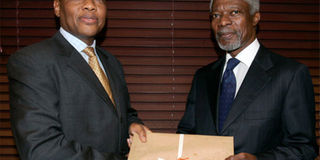Elders enjoined in Waki envelope case

Former UN Secretary-General Kofi Annan (right) receives a sealed envelope with a report on Kenya's post-election violence in 2007 from Justice Philip Waki, at Serena Hotel, Nairobi, on October 17, 2008. Kalenjin elders will be enjoined in a case in which an activist wants the names in Justice Philip Waki’s secret envelope made public. PHOTO | FILE | NATION MEDIA GROUP.
What you need to know:
- The envelope is said to have names of people suspected to bear the greatest responsibility for the 2007/2008 post-election violence.
- Unless the allegations were challenged, the past, present and future generations of Kalenjins would suffer prejudice in Kenya and beyond.
Kalenjin elders will be enjoined in a case in which an activist wants the names in Justice Philip Waki’s secret envelope made public.
The envelope is said to have names of people suspected to bear the greatest responsibility for the 2007/2008 post-election violence.
More than 1,300 Kenyans died and many others were injured while hundreds of thousands were displaced in the mayhem that followed the December 27, 2007 elections.
The elders, under the Myot Welfare Association, will participate as interested parties in the case filed by Dr David Matsanga.
The High Court Friday allowed the elders to be enjoined in the case so that controversy surrounding the envelope could be argued and determined as a whole.
The parties will return to court next month where the question of increasing the number of judges to at least three will be discussed.
The elders are represented by lawyer William Arusei and said they want to be part of the case because they were adversely mentioned during the commission of inquiry into post-election violence chaired by Justice Waki.
They said they were not given a chance to defend themselves.
The lawyer said the report made assertions which could belittle, defame or prejudice the Kalenjin people.
“The elders’ response was not sought before the report was published,” Mr Arusei told the court.
Unless the allegations were challenged, the past, present and future generations of Kalenjins would suffer prejudice in Kenya and beyond.
Dr Matsanga wants the government and the International Criminal Court compelled to make public the Waki Report.
He said he had filed a case at The Hague-based court and needed the report to advance it.
The Waki report was presented to President Mwai Kibaki and Prime Minister Raila Odinga in October 2008.
The commission then gave an envelope containing the names of alleged perpetrators of the violence to Mr Kofi Annan, who brokered a power-sharing deal between Mr Kibaki and Mr Odinga.
The names were finally handed over to ICC Chief Prosecutor Luis Moreno-Ocampo in early 2009 after Parliament rejected the creation of a special tribunal to try the suspects.
The case will be mentioned on December 9.




